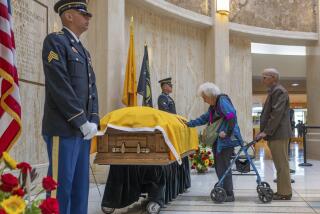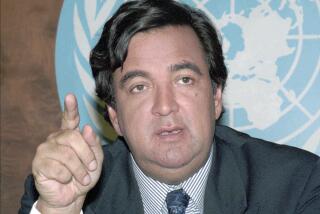An Unofficial Envoy Adds to Successes
- Share via
WASHINGTON — Described by White House officials as “dogged,” Rep. Bill Richardson (D-N.M.) has become an unofficial trouble-shooter for the Clinton Administration.
The unofficial diplomat has unilaterally undertaken a host of missions over the past two years--after first clearing them with the White House--that have helped to resolve impasses.
In his latest effort, Richardson helped secure the release of William Barloon and David Daliberti, two Americans who had been imprisoned in Iraq since March. Richardson had been quietly talking with Iraqi U.N. Ambassador Nizar Hamdoun for weeks to try to win the release of the pair, who were freed in Baghdad on Sunday. He launched his effort after an appeal by the prisoners’ wives failed to win their release.
“We owe a good deal to Congressman Bill Richardson,” Secretary of State Warren Christopher told Cable News Network after Barloon and Daliberti were released.
Richardson’s success in Baghdad wasn’t his first. In December, the 48-year-old lawmaker was in North Korea to discuss a U.S.-North Korean nuclear agreement when an American helicopter strayed across the demilitarized zone between the two Koreas and was shot down.
After talks with North Korean officials, he brought out the body of Chief Warrant Officer David Hilemon. Within a week, the other pilot, Chief Warrant Officer Bobby Hall, was freed.
“I think the only reason I was treated as well as I was is because Congressman Richardson was there creating such a big stir,” Hall said after his release, saying he believed that otherwise he would have been tortured.
In Myanmar, formerly Burma, Richardson was the first non-family member to meet with political opposition leader Aung San Suu Kyi during her years under house arrest. Two meetings with her in February, 1994, and one with the military junta led to a government pledge to open a dialogue.
Last month, he went back to Myanmar but was denied permission to see Suu Kyi. But his bill to deny funding for anti-drug programs to Myanmar, which was passed as an amendment to the foreign aid bill this year, is widely considered to have contributed to the Myanmar government’s decision to release her last week.
On the same trip last month, Richardson also went to Hanoi and met with Vietnamese officials, who turned over 100 pages of documents on American MIAs. The White House called the documents “very significant” and they were cited when President Clinton normalized diplomatic relations with Vietnam last week.
Richardson also got the Vietnamese to agree to allow a U.S. official to see and speak with a Vietnamese American prisoner who hijacked a plane and dropped anti-government leaflets over Vietnam.
Richardson was born in California and grew up in Mexico City before returning to the United States to attend high school and Tufts University in Massachusetts. He worked for the State Department, then for the Senate Foreign Relations Committee before moving to New Mexico in 1978.
He was elected to Congress in 1982.
More to Read
Get the L.A. Times Politics newsletter
Deeply reported insights into legislation, politics and policy from Sacramento, Washington and beyond. In your inbox twice per week.
You may occasionally receive promotional content from the Los Angeles Times.










